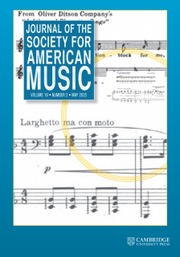No CrossRef data available.
Article contents
Mexican Folk Music and Theater in Early Twentieth-Century Southern California: The Ramona Pageant and the Mexican Players
Published online by Cambridge University Press: 04 February 2015
Abstract
In an environment of racial tension and conflict in Southern California during the first half of the twentieth century, the Ramona Pageant and the plays by the Padua Hills Mexican Players offered Mexican American performers a vital role in perpetuating cultural memory through music and dance. The Ramona Pageant, which began in Hemet, California in 1923 and is still in operation, remains one of the longest-running pageants, or historical dramas, in U.S. history. Similarly, the Mexican Players were founded during the Great Depression in 1931 in Claremont, California and performed continuously for more than forty years. This article argues that Hispanic musicians achieved a degree of cultural agency in these plays through the performance of Mexican folk music, especially canciones (love songs) and corridos (narrative ballads), which were essential elements in the “soundscape” of the Southwest. Although Anglos created and directed the plays, they did not create or perform the music. In spite of the plays’ largely romanticized portrayals of California's Spanish and Mexican past, they provided some of the few prominent forums in Southern California for Mexican American musicians and dancers during the first half of the twentieth century.
- Type
- Research Article
- Information
- Copyright
- Copyright © The Society for American Music 2015


